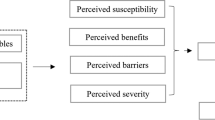Summary.
Objectives: To study consumers’ information needs for informed choice on colorectal cancer screening, and to develop and evaluate information material that is evidence-based and communicates benefit as well as lack of benefit and risks as natural frequencies.
Methods: Design: Focus group study; during a first round consumers’ needs and attitudes were surveyed, in a second round the information material was evaluated. The study was carried out in Hamburg, Germany. Participants: 50 women and men, 40 years or older without colorectal diseases.
Results: Consumers opted for traditional information that advises and guides them. If consumers were nevertheless given evidence-based information that considers the defined criteria it evoked cognitive dissonance which consumers tried to cope with by devaluating, minimising and not noticing the information. Cognitive dissonance inhibits processing of information. Researchers are confronted with a dilemma to either respect consumers’ requests or to facilitate informed choice.
Conclusion: Cognitive dissonance may be a barrier to informed choice. This should be considered when aiming at communicating risk information.
Zusammenfassung.
Risikoinformation – Hindernis für die informierte Entscheidung? Eine Fokusgruppenstudie
Fragestellung: Es werden die Informationsbedürfnisse von Verbrauchern zur informierten Entscheidung zur Darmkrebs-früherkennung untersucht und Informationsmaterial entwickelt und evaluiert, welches evidenz-basiert ist und sowohl den Nutzen als auch den fehlenden Nutzen und Risiken in natürlichen Häufigkeiten darstellt.
Methoden: Studiendesign: Fokusgruppenstudie; in der ersten Diskussionsrunde wurden die Informationsbedürfnisse und Einstellungen der Verbraucher erhoben, in der zweiten Runde wurde das Informationsmaterial evaluiert. Die Studie wurde in Hamburg, Deutschland, durchgeführt. Teilnehmer: 50 Frauen und Männer, 40 Jahre und älter ohne Darmerkrankungen.
Ergebnisse: Die Verbraucher wählten traditionelle Informationen aus, die Ratschläge und Anleitung geben. Wenn Verbrauchern dennoch evidenz-basierte Informationen vorgelegt wurden, die die definierten Kriterien berücksichtigten, wurde kognitive Dissonanz evoziert, die die Verbraucher durch Abwertung, Minimierung und Nicht-Zur-Kenntnisnahme versuchten zu bewältigen. Kognitive Dissonanz hemmt die Informationsverarbeitung. Die Forscher sind mit dem Dilemma konfrontiert, entweder die Forderungen der Verbraucher zu respektieren oder aber die informierte Entscheidung zu fördern.
Schlussfolgerungen: Kognitive Dissonanz könnte ein Hindernis für die informierte Entscheidung sein. Dieses sollte berücksichtigt werden, wenn Risikoinformationen kommuniziert werden sollen.
Résumé.
Information de risque: obstacle pour la décision ìnformée? Une étude de focus groups
Objectifs: Etudier quelles sont les informations nécessaires aux consommateurs pour que ces derniers soient en mesure de prendre une décision informée face au dépistage du cancer colorectal. Développer et évaluer un matériel évidence-basée sur les données probantes et qui mette en évidence aussi bien les avantages que les risques.
Méthodes: Etude par focus group: dans un premier temps, les besoins en matière d’information et les attitudes des consommateurs ont été identifiés; dans un second temps, le matériel informatif a été évalué. L’étude a été conduite à Hambourg (Allemagne), avec 50 femmes et hommes, âgés de 40 ans et plus sans maladie colorectale.
Résultats: Les participants ont préféré les informations traditionelles (conseils et information). Lorsqu’ils sont quand même données des information évidence-basée, dissonance cognitif était suscité, que ces personnes ont essayé de minimiser ces informations ou de les ignorer. Les enquêteurs sont donc confrontés au dilemme suivant: respecter les demandes des consommateurs, ou promouvoir la décision informée.
Conclusions: Le dissonance cognitif peut être un obstacle pour la décision informée. Ce point devrait être pris en compte lors de toute communication.
Similar content being viewed by others
Author information
Authors and Affiliations
Corresponding author
Rights and permissions
About this article
Cite this article
Steckelberg, A., Kasper, J., Redegeld, M. et al. Risk information – barrier to informed choice? A focus group study. Soz.-Präventivmed. 49, 375–380 (2004). https://doi.org/10.1007/s00038-004-3153-4
Published:
Issue Date:
DOI: https://doi.org/10.1007/s00038-004-3153-4



